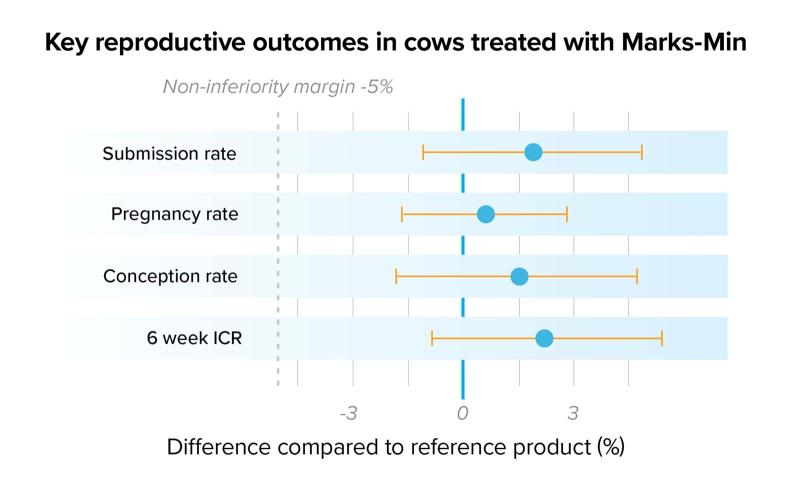

Trace minerals are required for optimal growth, reproduction, and immunity. Optimising trace mineral status relying solely on oral supplements across a herd may fail because of variation in individual intake and reduced absorption due to antagonism of other ration components and minerals.
Any aspect of trace mineral status impairment can have significant implications on the cow. There is only a short window of two to three months where the cow has a chance of becoming pregnant in time to remain in sync with our production systems and produce a calf every year.
The use of injectable trace mineral supplements has been associated with positive reproductive outcomes including improved conception rate, increased odds of pregnancy and greater final in calf rate.
A study conducted on 2,168 dairy cows, administered injectable trace minerals, four weeks prior to calving and again four weeks prior to the start of mating showed treated animals had a 3.3% greater final in-calf rate, and a reduced time from start of mating to conception, compared to control animals1.
Another study has shown that cows treated with injectable trace minerals were associated with a significant reduction in both clinical and subclinical mastitis, highlighting the benefits that trace element supplements can have on pasture-based dairy cows2.
Dr Carl Eden, Technical Services Veterinarian with Boehringer Ingelheim says “Vitamin B12 is sometimes referred to as a ‘super vitamin’ because it is only required in very small amounts but vital to many essential metabolic pathways. However, demand for B12 can vary considerably during the year and we see serum levels of B12 fall at critical times, such as the first few months after calving.”
Vitamin B12 contains cobalt, so deficiency in cobalt can lead to deficiency in vitamin B12 because ruminants get most of their B12 as a byproduct of ruminal fermentation where the bacteria in their rumen assemble B12 from cobalt for use by the cow.
Sub-optimal trace mineral and vitamin B12 status at calving, mating, and drying off has been shown to negatively impact growth, reproduction, and immunity.
Using a trace mineral injectable containing vitamin B12 can improve trace mineral and vitamin B12 status at these critical times.
In the largest trace element study to date, Marks-Min Injectable Trace Mineral with Vitamin B12 demonstrated remarkable results when compared to a reference trace mineral injection.
“Given the differences between Marks-Min and other products on the market, we wanted to generate a compelling data set to demonstrate how effective it was compared to the pioneer product. We entrusted this work to a third-party research company” says Dr Eden.
“We chose farms that were at the top of their game from a reproductive perspective. We made sure that the farms had no evidence of trace element or vitamin B12 deficiencies or excess.”
Across all outcomes of interest, Marks-Min demonstrated clear non-inferiority when compared to the reference product. Outcomes measured included submission, pregnancy and conception rates, and six week in-calf rate. Marks-Min demonstrated it is highly suited as an alternative treatment to the reference product.

Dr Eden commented “We all love data, and this is a great data set as it opens options. Marks-Min joins the ranks of proven injectable trace mineral preparations and gives advisors and farmers an alternative to Multimin with the added benefit of B12 to support optimal health fertility and production.”